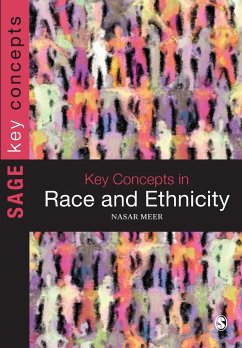
Key Concepts in Social Gerontology
Versandkostenfrei!
Versandfertig in 6-10 Tagen
33,99 €
inkl. MwSt.
Weitere Ausgaben:

PAYBACK Punkte
17 °P sammeln!
"Far from a dictionary, the concepts are portrayed as complex, and conflicting definitions and usages are both noted and evaluated... Each article includes a (necessarily selective) set of references, and cross-references to other concepts included in the book... Moreover, the coverage and evaluation of the concepts is right at the current leading edge in a rapidly moving field."- Victor Marshall, Department of Sociology and Institute on Aging, University of North Carolina at Chapel Hill"The concepts are very clear and very relevant, and fantastic for my group of undergraduate students... I fo...
"Far from a dictionary, the concepts are portrayed as complex, and conflicting definitions and usages are both noted and evaluated... Each article includes a (necessarily selective) set of references, and cross-references to other concepts included in the book... Moreover, the coverage and evaluation of the concepts is right at the current leading edge in a rapidly moving field."
- Victor Marshall, Department of Sociology and Institute on Aging, University of North Carolina at Chapel Hill
"The concepts are very clear and very relevant, and fantastic for my group of undergraduate students... I found each concept to be succinctly and simply captured, holding enough information to satisfy initial cravings and complex enough to tempt further reading... I had originally thought that this book would provide supplementary reading as part of my 'Healthy Ageing' course, but have changed my mind to essential reading now I have had the opportunity to read the entire book."
- Dr Meredith Tavener, Groningen University
Social gerontology is a new and dynamic field reflecting the increasing interest in ageing across the world. This book provides a readily accessible guide to well established and contested issues, as well as new concepts emerging through cutting edge research in the discipline.
The entries give concise, lucid knowledge on what constitutes the 'building blocks' of social gerontology and sets out a clear review of the core concepts, both classic and emerging, in this subject area.Each concept is explored in terms of its history, application, usefulness to theory and research, and significance in practice. They go beyond simple definitions of the concepts to look at how each issue has shaped the discipline of social gerontology today.
This book is authored by social gerontologists from the UK and the USA. Together they present an interdisciplinary perspective and reflect a global approach to the presentation of key concepts in social gerontology.
- Victor Marshall, Department of Sociology and Institute on Aging, University of North Carolina at Chapel Hill
"The concepts are very clear and very relevant, and fantastic for my group of undergraduate students... I found each concept to be succinctly and simply captured, holding enough information to satisfy initial cravings and complex enough to tempt further reading... I had originally thought that this book would provide supplementary reading as part of my 'Healthy Ageing' course, but have changed my mind to essential reading now I have had the opportunity to read the entire book."
- Dr Meredith Tavener, Groningen University
Social gerontology is a new and dynamic field reflecting the increasing interest in ageing across the world. This book provides a readily accessible guide to well established and contested issues, as well as new concepts emerging through cutting edge research in the discipline.
The entries give concise, lucid knowledge on what constitutes the 'building blocks' of social gerontology and sets out a clear review of the core concepts, both classic and emerging, in this subject area.Each concept is explored in terms of its history, application, usefulness to theory and research, and significance in practice. They go beyond simple definitions of the concepts to look at how each issue has shaped the discipline of social gerontology today.
This book is authored by social gerontologists from the UK and the USA. Together they present an interdisciplinary perspective and reflect a global approach to the presentation of key concepts in social gerontology.














